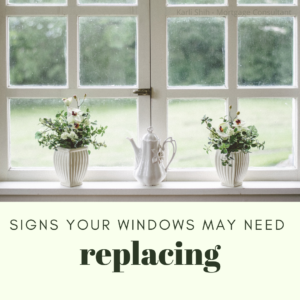
What’s involved in replacing the windows of a home? And what are the indications that you might need to replace yours? Let’s take a look at some questions you might have.
new home, old windows
When you purchase a home, you receive a seller’s declaration. This is a document that contains all the information about your home that the previous owners are aware of. Hopefully, it will tell you when the windows were last replaced.
In my case, the declaration did not.
We knew going into the home that the windows would need to be changed sometime in the future, as they are outdated (probably from the 80s) and not very energy efficient. We didn’t anticipate that they could possibly leak, as there was no indication from the previous owner that they had leaked.
It’s a good idea to pay specific attention to the windows of the home when you make an offer to buy. It’s one of those things that you usually take as-is, but can be a costly expense to change.
According to moving.com, new windows can increase the sale value of a home, but in order for a return on investment to be made, you need to really upgrade the type of windows and frames you have. This can be a costly and time-consuming endeavour, as with the current COVID situation, there are significant manufacturing delays in the production of windows. While we’ll be putting in more energy-efficient windows at my home, the return on investment will be minimal, as it’s definitely a more functional renovation.
If we had known that the windows had needed replacing before purchasing the house, there’s a good chance we could have negotiated the price down slightly.
signs your windows might need replacing
There are a number of signs that indicate it’s time to replace your windows. Let’s take a look at some of them, as highlighted by Mike Holmes:
- Your windows are weeping: Not that they’re sad, mind you. Rather there’s a buildup of moisture on the inside brought about by poor sealing. This results in air from the inside of your home mixing with air from the outside, and moisture manifesting itself.
- Your frames are rotten: Older window frames might not have the proper insulation, and they might have rotted as a result. This can lead to air and moisture leaking into your home, which leads to the costly repair of having your windows replaced.
- Air drafts: Does it feel colder around your windows? Do you get a cool breeze coming in when you don’t want one? These are signs of air drafts, and could indicate your windows need replacing. While you might be able to re-caulk your windows and add weather stripping, this might only be a temporary solution.
- Single panes: If your windows are older, they might only have single pane glass. These aren’t energy efficient, and also let in a lot of unwanted sound. Replacing your windows will make heating your home cheaper, and give you more peace and quiet.
the cost of replacing windows
As with most renovations, the cost of replacing your windows can vary greatly. Factors like the type of window you’re looking to replace, the materials you want your new windows to be made of, and how many layers of panes you want to have all affect the total cost.
In Ontario, the average cost of replacing a window is somewhere between $800-1200, and about $2,500-4,000 for bay or bow windows, plus tax. So for an average house of about 10 regular windows, you’re looking at around $8,000-12,000.
Is there siding on your house where the windows have been leaking? If so, there’s a chance there could be mould or other damage behind it. If this is the case, you’ll want to replace the siding as well. While significantly less than the cost of windows, it’s still an added expense.
You’ll definitely want to get a few quotes from different companies when you’re looking at replacing your windows, as the experience each company has can also affect the price and quality of installation. If you pay top dollar for high quality windows, and have a company install them that doesn’t have a lot of experience, you can end up having an even more expensive problem to deal with in the future, or find that for all the money you spent, the problems persist.
When you’re looking at replacing your windows, really consider all the factors. While you might love to have a fancy aluminum or beautiful wood frame, these fixtures cost more than your basic white PVC frame. And a well-installed PVC frame can provide just as much protection from the elements as these other options.
saving money with window replacement
As mentioned above, if you have old windows, changing them to more energy efficient ones can end up saving you on your monthly bills. By converting old windows, you can potentially save up to 25% on your heating bills.
And while the cost of installing energy efficient windows may seem prohibitive at the start, the good news is that there may be incentives available. It’s worth digging around to see what the active rebates are before starting renovations, and if you have any questions, talk to your renovator to see if they are aware of any incentives you might not be.
home inspectors can’t see everything
In a competitive housing market, you won’t always have the opportunity to get a home inspection done before you buy a home. This is unfortunate, as a good home inspector can help point out potentially problematic areas in your home-to-be, elements that might help you get a reduction in price. If you are unable to get an inspector in before buying your home, it’s a worthwhile investment to have one come in after the fact, as they can still help identify areas that might be problematic.
But even if you get a home inspector to check out your place, they may not be able to catch everything, and unfortunately, potentially leaky windows are something that can be missed.
If you are able to get a home inspector into your space, request that they check the seals around the windows and ensure that there are the appropriate sills at the base of the frames outside of the house. They can also check for various signs of water damage around the windows of your house.
Similarly, if you’ve had renovations done on your home, or if you’ve had the whole place painted, ask the people who’ve done the work if they noticed any indications of water damage. Damage can be anything from watermarks, rippled paint, or mould growing in the insulation. If signs have been present, you should be prepared to tackle the potentially costly affair of having your windows replaced.
anticipate the seasons
With the delays in supply chains and manufacturing, it’s important to think ahead. With spring just around the corner, now is the time to take action if you want to change your windows. Seeing as the delay can be two to three months, it’s going to be summer before they’re installed, which is a perfect time of year to get them replaced. If you wait, you could find yourself dealing with cold-winds drafting through your windows and possibly moisture creeping in.
Remember to get a few quotes, and take the time to really consider what your window needs are. While you’ll save some money on heating, the price you pay to replace your windows won’t have a profound impact on the resale value of your home.


